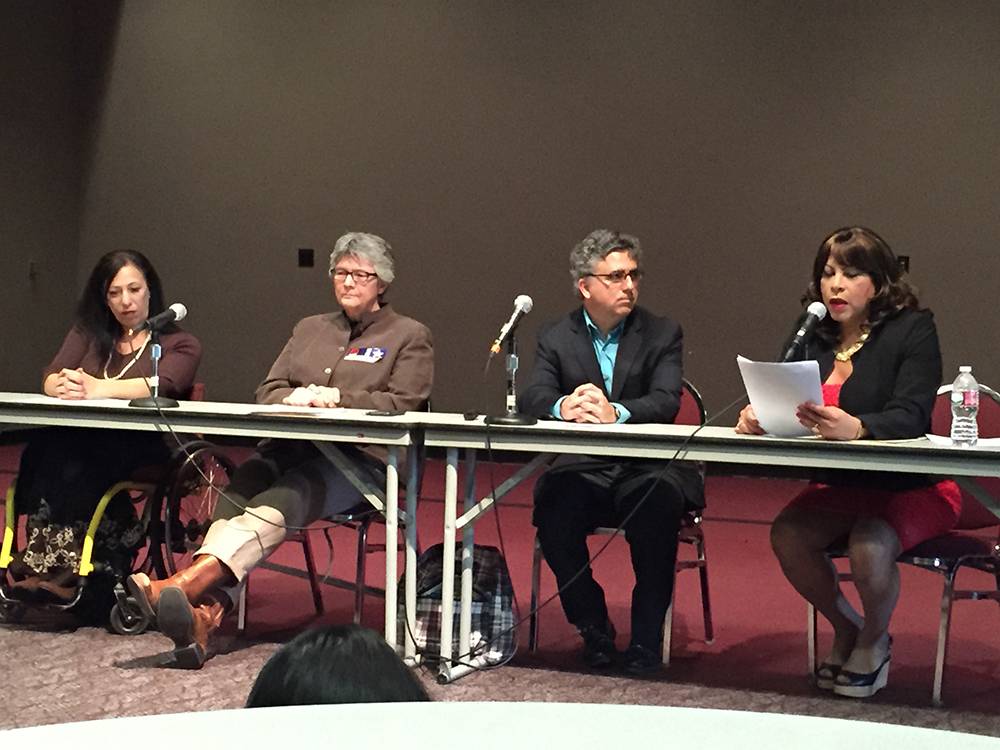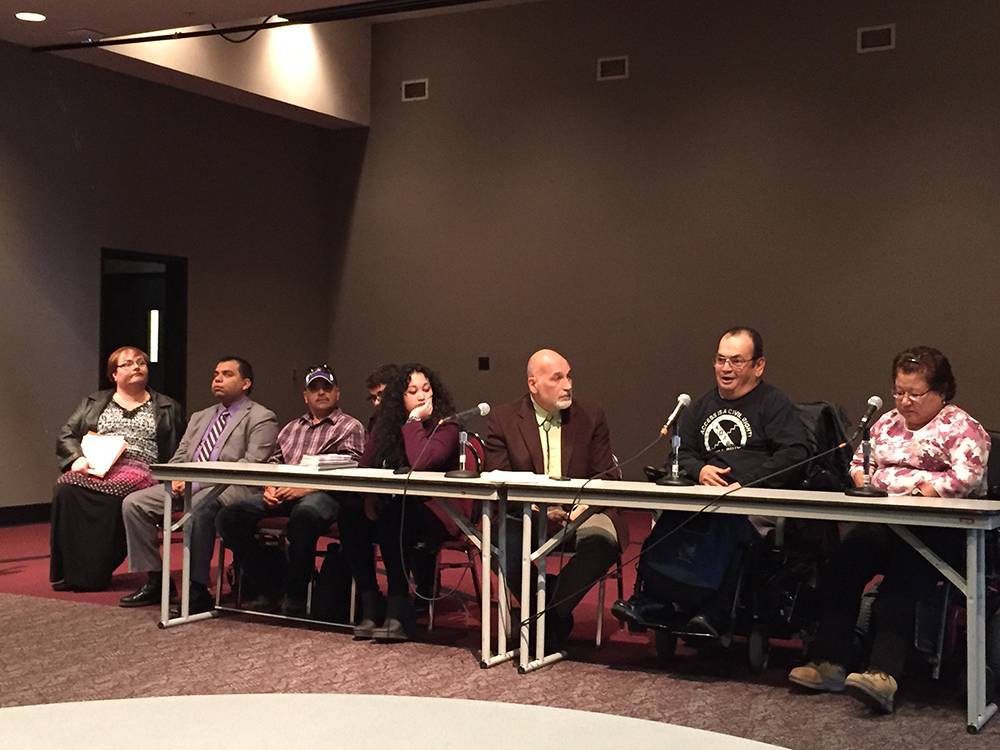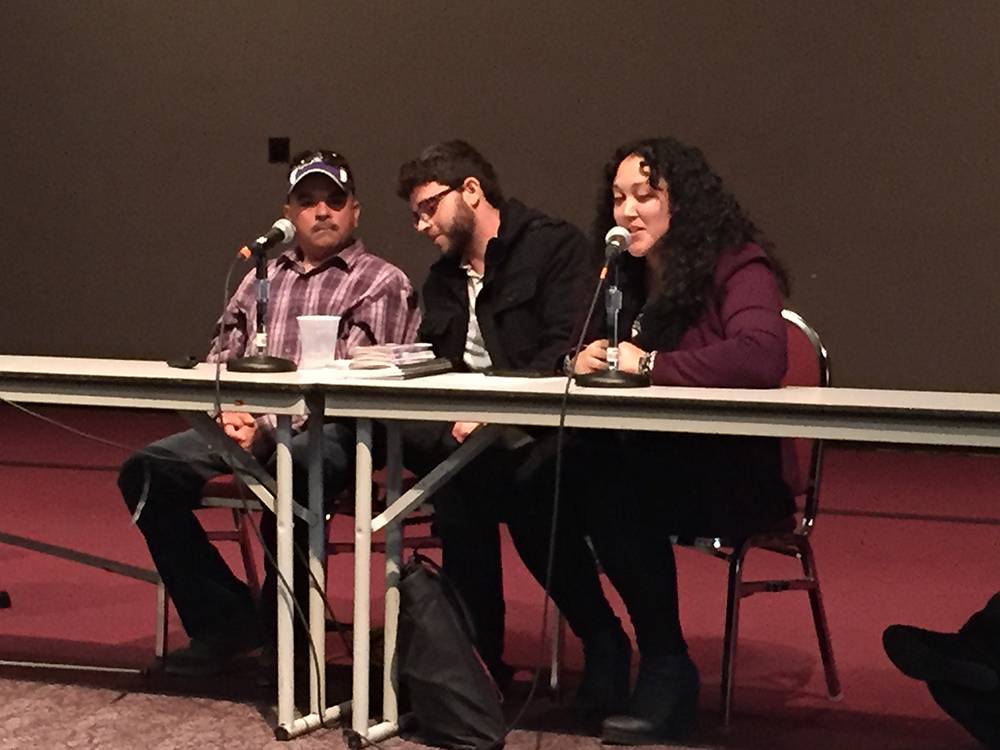The Legacies panel brought the brittle nature of these masculine national ideals. Elia Chino, founder and director or Fundacion Latinoamericana de Accion Social, shared the way sexual violence accompanied him on the way to elementary school in rural Michoacan. As he traveled further for middle school, the attacks from male kin and neighbors intensified. Elias moved to Mexico City and then to Nashville to further his ministerial schooling. When AIDS arrived, she found herself with her ‘amigos’, building a community of love in the streets and hospitals of Houston, Nashville, and Mexico City. Elia was frequently the only person with her amigos in their hospital beds on the floors dedicated to people with AIDS. The three panelists treated the importance of a loving political community, with Maria Palacios nodding to feminist arts and crip collectives, and Elia Chino to the church of Christ, Jesus’ faith in her, and the love of her friends in Houston. This carried over to a discussion of touch, to the ways sexuality and desire shape the experience and presentation of disability. Transformation, in these cases, came out of dependence and reciprocity, not distance and independence.
Presencias Urgentes
Latino Communities and the 25th Anniversary of the ADA
Presencias Urgentes Legacy Panel
Presencias Urgentes 2nd Panel
The Precedents panel directly examined the politics and struggles of Latinos with disabilities since the ADA. Jo Berra, lead advocate for the disabilities section at the Texas Civil Rights Project, led a conversation about becoming activists with Renee Lopez and Daniel Saenz, both with ADAPT. Family provided the first context, with Daniel Saenz discussing the ways his family opened informal ways for him to access transportation. He then discussed his decision to use civil disobedience to challenge Greyhound’s long-standing prohibition of people on wheelchairs: that is, he chained himself to the bus’s luggage compartment to point out he had less rights than luggage. Renee traced the ways she was treated differently. Gabriel Cazares, National Federation of the Blind, followed with his reflections on growing up in Houston blind, gay, in an evangelical family, with a father who is blind, a self-taught musician and a Pentecostal minister. As he drily pointed out, “this makes for interesting thanksgiving dinners.” Ana Canevaro, Center for Disabilities at the University of Texas, charted the intellectual labor it takes to get schools and families to recognize disabilities in Latino families. Here, her emphasis on the importance of priests and fathers in Latino communities as key arbiters of access resonated ruefully with many of the other panelists.
Presencias Urgentes 3rd Panel
Maxie Gallardo, staff attorney at Workers Defense Project, Felix Gutierrez, Workers Defense Project member, and Daniel Machado, translator, used Felix Gutierrez’ experience being abandoned at an emergency room by his contractor and his inability to get prescriptions for pain medications to help his recovery from back surgery to reflect on the ADA: that is, the ADA can do little to stop workplaces from disabling workers and creating people with disabilities. With no law requiring workmen’s compensation, rest breaks, or criminalizing wage-theft and workplace injuries in Texas, law-breaking subcontractors and shell companies, Gallardo, Machado, and Gutierrez predicted, will bring about more preventable deaths and disabilities.
-
Program Details
On July 26, 1990, President George Herbert Walker Bush signed the Americans with Disabilities Act into law. For many people in the United States, this law brought questions of disability into civil rights parlance, making a conversation about access, discrimination, and reasonable accommodation part of civil rights. For too many others, this law helped bring their experience of structural discrimination and open exclusion into view. For a select few in the LBJ Student Center Ballroom, they remembered being part of the ceremony as well as the public acts of civil disobedience – most notably the Capitol Crawlers – that helped bring the bill into reality. Latinos – like panelists Maria Palacios, Daniel Saenz, and Renee Lopez - were present in many of the battles before the ADA. Crip Power, indeed.
The conference – Presencias Urgentes – was organized in two parts. The first focused on Legacies – what the broad dimensions of Latina and Latino lives are like when disability is added to the mix. The second – Precedents – traced the impact of the ADA in the arc of cultural and legal struggles over disability, disabling conditions, and what civil rights mean to Latinos with disabilities.
The panelists were urgent presences themselves. In the Legacies panel, Maria Palacios, a Capitol Crawler herself, kicked off the conference with a love poem to the movement, a poem touching on the erotic and cultural dimensions of political solidarity that included her, a polio survivor recently arrived from Ecuador, in the mix of people involved in the Crip Power movement. Katherine Ott, an author and curator at the National Museum of American History, focused on the importance of stuff to understanding peoples, bodies and cultures in the United States. Objects like El Cortito (the short-handed hoe hated by farmworkers), the fertilizer sprayer, and ladders (for roofers) speak to the ways technology can damage the body in ways hard to quantify. Retablos, hierbas, and even stylish dress speak to the ways many people sought relief and succor from pain. Moreover, Ott reflected, these reciprocal ideals coexist uneasily with an American ideal of the independent, property-owning, productive, father or the ‘feo, fuerte, y formal’ [blunt, strong, and curt] ideal embodied in Golden Age cinema.
The Legacies panel brought the brittle nature of these masculine national ideals. Elia Chino, founder and director or Fundacion Latinoamericana de Accion Social, shared the way sexual violence accompanied him on the way to elementary school in rural Michoacan. As he traveled further for middle school, the attacks from male kin and neighbors intensified. Elias moved to Mexico City and then to Nashville to further his ministerial schooling. When AIDS arrived, she found herself with her ‘amigos’, building a community of love in the streets and hospitals of Houston, Nashville, and Mexico City. Elia was frequently the only person with her amigos in their hospital beds on the floors dedicated to people with AIDS. The three panelists treated the importance of a loving political community, with Maria Palacios nodding to feminist arts and crip collectives, and Elia Chino to the church of Christ, Jesus’ faith in her, and the love of her friends in Houston. This carried over to a discussion of touch, to the ways sexuality and desire shape the experience and presentation of disability. Transformation, in these cases, came out of dependence and reciprocity, not distance and independence.
The Precedents panel directly examined the politics and struggles of Latinos with disabilities since the ADA. Jo Berra, lead advocate for the disabilities section at the Texas Civil Rights Project, led a conversation about becoming activists with Renee Lopez and Daniel Saenz, both with ADAPT. Family provided the first context, with Daniel Saenz discussing the ways his family opened informal ways for him to access transportation. He then discussed his decision to use civil disobedience to challenge Greyhound’s long-standing prohibition of people on wheelchairs: that is, he chained himself to the bus’s luggage compartment to point out he had less rights than luggage. Renee traced the ways she was treated differently. Gabriel Cazares, National Federation of the Blind, followed with his reflections on growing up in Houston blind, gay, in an evangelical family, with a father who is blind, a self-taught musician and a Pentecostal minister. As he drily pointed out, “this makes for interesting thanksgiving dinners.” Ana Canevaro, Center for Disabilities at the University of Texas, charted the intellectual labor it takes to get schools and families to recognize disabilities in Latino families. Here, her emphasis on the importance of priests and fathers in Latino communities as key arbiters of access resonated ruefully with many of the other panelists. Maxie Gallardo, staff attorney at Workers Defense Project, Felix Gutierrez, Workers Defense Project member, and Daniel Machado, translator, used Felix Gutierrez’ experience being abandoned at an emergency room by his contractor and his inability to get prescriptions for pain medications to help his recovery from back surgery to reflect on the ADA: that is, the ADA can do little to stop workplaces from disabling workers and creating people with disabilities. With no law requiring workmen’s compensation, rest breaks, or criminalizing wage-theft and workplace injuries in Texas, law-breaking subcontractors and shell companies, Gallardo, Machado, and Gutierrez predicted, will bring about more preventable deaths and disabilities.
All of the panelists emphasized the primacy of family, both in creating damaging stories about people with disabilities and providing an alternate form of value to American culture. For the presenters, the experience of disability in working-class barrios among working class families preceded the direct experience of anti-Latino discrimination; with more activist involvement, the panelists began to see the ways in which racism and sexism also shaped the possibilities of their lives. Elia Chino made it clear that the jornaleros she meets regularly face workplace injuries and HIV, but that the worlds that transgender and transmigrant Latinos live in Houston are almost never part of policy debates or popular culture. The relative absence of the ADA in this conversation about the ADA and Latino community mobilization made it clear that life trumped the law, and the ADA was another tool used to challenge discrimination in the United States.
The conference started with the premise that disabilities and dependencies are part of everyone’s experience of being human. However, rather than viewing the ADA as the end of long struggles, the panelists at Urgencias Presentes emphasized that ongoing activism can make the ADA real. That disability, like latinidad, comes in all shapes, sizes and orientations, and – like Latinos – can make itself present in surprising ways. A conference on disability in Texas brought people from lowland Ecuador, the guajira in Venezuela, Veracruz, Michoacan, Houston, Corpus Christi, Albuquerque, and Austin. Texas, like the South, needs to grapple with its transnational connections and domestic realities.
-
Accompanying Websites
Houston Center for Independent Living
Katherine Ott | National Museum of American History
Ana Canevaro, coordinator | Texas Center for Disability Studies
Gabriel Cazares | National Federation of the Blind
Daniel Machado, member | Workers Defense Project



